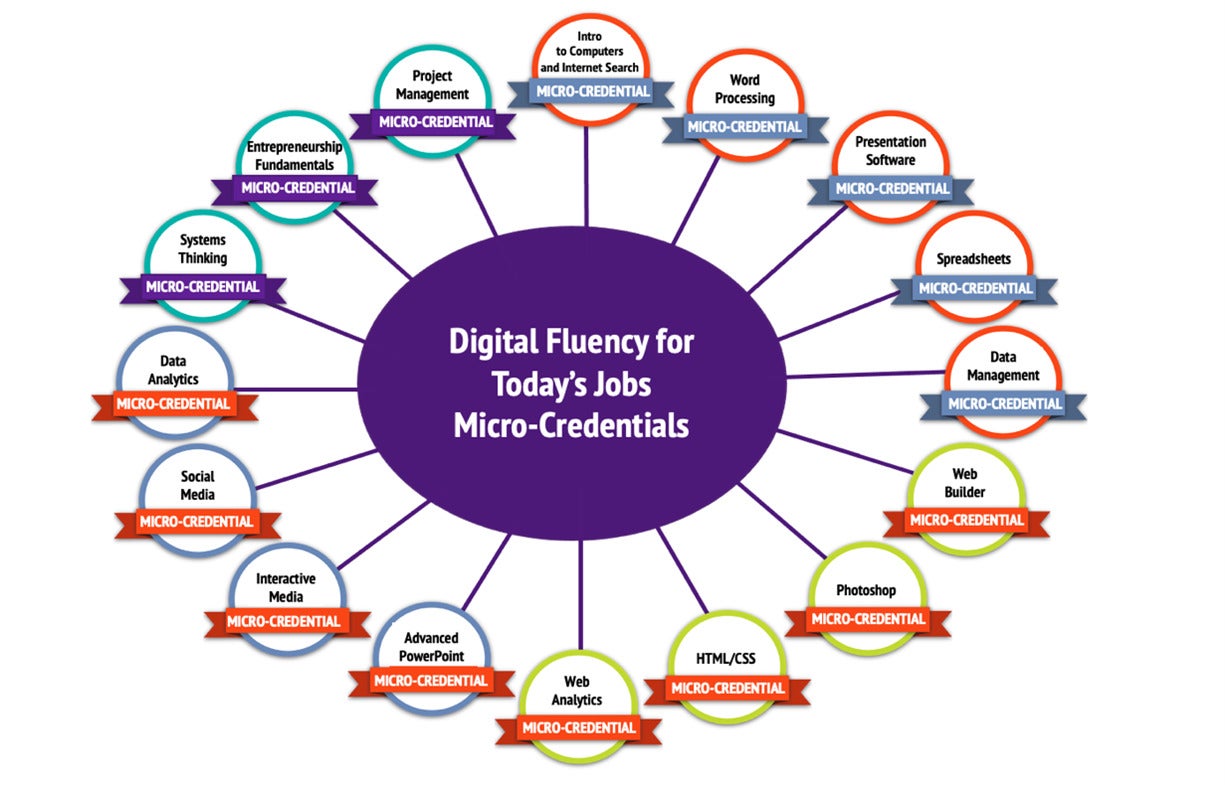The pandemic has changed our everyday life: the way we work, the way we shop, and the way we socialize and communicate. Business owners, organizations, and employees have made drastic shifts to accommodate their constituents in this new reality. Theresa Paucar, the owner of Supermercado Martin’s, a supermarket chain with three stores in a prominent Latino neighborhood in the Northwest of Chicago, is but one example. The pandemic forced her to consider introducing new technology to remain competitive in her industry, with customers increasingly leaning towards placing online orders and getting groceries delivered. Theresa faced a conundrum: her employees were uncomfortable with new technology, and she did not have the resources or tools to provide digital skills training. Theresa is not an outlier: for millions of Latino and other minority business owners, this is a daily struggle, an increasingly urgent one. As digital tools and platforms become increasingly central in our economy and society, it is essential to provide digital skills training to the emerging and incumbent workforce and meet the demands of the changing labor market. Particularly concerning is the fact that Latinos face the highest rates of potential job displacement due to automation and digitalization.
Austin Community College District is addressing the digital skills challenge through its Digital Fluency for Today’s Jobs initiative. Austin Community College (ACC) is a nationally recognized college serving Central Texas as a gateway to higher education, providing open-door access to education for students who want to earn a degree, learn a marketable skill, or advance their careers. Opened in 1973, ACC has grown to 11 campuses and nearly 76,000 students. Among other achievements, ACC was listed as one of the Top 25 community colleges for Hispanics. They also earned the Seal of Excelencia certification.
The Digital Fluency for Today’s Jobs initiative originated through ACC’s involvement in the BACK TO WORK 50+ grant awarded by AARP Foundation through the Social Innovation Fund. The grant helped people over 50 get a job. A significant proportion of the participants were Latinas who did not have the confidence to apply for a job due to a lack of digital skills. Considering that Austin is a high-tech industry hub and that 75% of local job postings require advanced digital skills, there was an urgent need to address the skills mismatch. The digital blind spot, however, was not exclusive to the 50+ age population but was also true for approximately half of the African American workforce and 57% of the Latino workforce.
ACC’s childcare and development program attracted an overrepresentation of Latinas, who were taking 6+ years to complete degrees. For many of them, graduating was an incredibly arduous process; their bandwidths stretched too thin by working several jobs in addition to caretaking responsibilities. Even more disheartening, their education resulted in low-paying childcare jobs averaging $8 an hour in a city with soaring housing costs. As a result, ACC administrators identified a unique opportunity and are in the process of embedding digital skills programming into their childcare and development curriculum to open career pathways leading to better-paid positions, such as management positions in daycare centers.
To enhance participants’ confidence and adapt to their evolving needs, ACC decided to transition from third-party platforms to developing their own competency-based, user-friendly, and self-paced platform. Based on research identifying skills most in-demand to get an entry-level job, ACC integrated training addressing soft skills such as communication and organizational skills, with digital fluency in software such as Microsoft, Google, and Apple suites. Other sought-after digital skills included data analytics, HTML and CSS for website design, Photoshop, and social media marketing.
Digital fluency rather than digital literacy was the guiding principle for ACC’s curriculum design. ACC recognized that the empowerment of new digital users required adaptability and a fluid approach to life-long learning to succeed in a changing technological landscape. The programming was structured into four courses aligned with specific competencies required by employers:
- Computer Skills for Job Readiness (Microsoft Office/Google/Apple Suites)
- Internet & Web Page Development (Analytics, HTML/CSS, web builders, Photoshop)
- Presentation Graphics Software (Advanced PowerPoint, Analytics, Social media, and video design)
- Capstone Course (covering the above digital fluency skills plus professional competencies such as communication, collaboration, organizational skills, and problem-solving)
The first course was fully developed and tested in Summer 2021, with positive feedback, and will be offered to the public in Summer 2022. Funding from a Texas Reskilling and Upskilling through Education grant via the Governor’s Emergency Education Relief fund has enabled the development of the three remaining courses; these will be offered in the Summer and Fall of 2022. The programming concludes with an additional, free 4-week course in digital job search skills entitled, “Strategies for Today’s Jobs.” All 4 courses lead to an occupational skills award that stacks into two credit-bearing certificates, then onto a two-year degree, and ultimately, onto ACC’s new four-year degree in Software Development.
However, ACC’s administration found a need to offer Digital Fluency not just to some students but to all students. As a result, the four courses are now in the process of being built and offered as smaller, non-credit, micro-credentials aligned with professional core competencies. These micro-credentials will serve as ACC’s Quality Enhancement Plan for reaccreditation purposes through the Southern Association of Colleges and Schools Commission on Colleges.

The way ahead
ACC identified the need to build a sense of community that can feel like a safe space for students to ask for help and faculty to support accordingly, which can be challenging in virtual environments. The key to this effort will be the incorporation of a system of floating tutors or “digital navigators,” into the programming that can meet students’ unique learning needs. Faculty and staff training is also critical to keeping pace with high-demand, digital workforce skills, which can be met with this competency-based education model. Supportive reinforcement tools that have proved effective include AI-driven messaging with positive, customized feedback. Micro-badges will serve as incentives to engage students and increase completion rates. The ACC team is also considering hiring Spanish-speaking tutors and translating materials into Spanish to address the needs of their Spanish-speaking student body and community members, many of whom are small business owners requiring digital upskilling.
Finally, there is no progress if digital devices, access to broadband, and basic computer skills, continue to be out of reach for many. While ACC campuses are equipped with computer labs called ACCelerators offering both PC and Apple computers, access to broadband internet, and staff providing tech support, one critical pain point surfaced – a training module on basics such as how to open the computer or how to access the hard drive was sorely missing.
As ACC moves forward and launches its pilots later this year, others are taking notice. The City of Austin Utility company has shown interest in exploring the digital upskilling of its Signs and Markings employees within the Austin Transportation Department to open career pathways in management for some of their frontline workers, many of whom are Latinos. If successful, the ACC case can inspire other Hispanic-serving institutions working to advance digital equity and economic opportunity in their communities. These and other promising approaches to upskill Latino workers and business owners will be covered in a report to be launched by the end of March 2022.
About the project
The Digital Skills and the Latino Workforce project is a partnership between the Latinos and Society Program and the UpSkill America Initiative at the Aspen Institute. Our goal is to learn how digitalization and automation of work impact Latino frontline workers and Latino-owned businesses across sectors. The resulting white paper will identify promising approaches to digital skills development within this segment of the workforce and business community.
We are grateful to Linda Smarzik, Dean of Computer Science and Information Technology, and Ann Pamela Saez, Director of Student Impact & Outcomes at Austin Community College, for their time and collaboration with our research team. We also thank Google.org for supporting this project.


